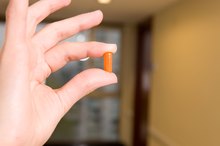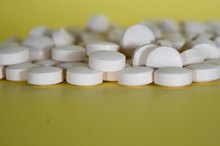What does fact checked mean?
At Healthfully, we strive to deliver objective content that is accurate and up-to-date. Our team periodically reviews articles in order to ensure content quality. The sources cited below consist of evidence from peer-reviewed journals, prominent medical organizations, academic associations, and government data.
- MayoClinic.com: Thiamine (Vitamin B1)
- BMC Pharmacology: Benfotiamine, a Synthetic S-acyl Thiamine Derivative, Has Different Mechanisms of Action and a different Pharmacological Profile Than Lipid-Soluble Thiamine Disulfide Derivatives
- MayoClinic.com: Thiamine (Vitamin B1) Dosing
- MayoClinic.com: Thiamine (Vitamin B1) Safety
The information contained on this site is for informational purposes only, and should not be used as a substitute for the advice of a professional health care provider. Please check with the appropriate physician regarding health questions and concerns. Although we strive to deliver accurate and up-to-date information, no guarantee to that effect is made.
How Much Thiamine & Benfotiamine Is a High Dose?
Your body uses thiamine, also known as vitamin B-1, for numerous functions. A synthetic form of thiamine, benfotiamine, offers superior bioavailability, and physicians prescribe this compound for therapeutic purposes 1. There is no tolerable upper limit for thiamine or benfotiamine, although there are some standard doses. Consult your physician before taking any dietary supplements.
Identification
Thiamine helps your nervous system and muscles function properly and aids in metabolism and digestion. Because thiamine is water-soluble, very little is stored in your body and you can become deficient in just 14 days, according to the Mayo Clinic. Benfotiamine helps to prevent diabetic complications by increasing thiamine absorption in the liver and the blood, preventing tissue damage. However, benfotiamine has no effect on thiamine levels in the nervous system.
- Thiamine helps your nervous system and muscles function properly and aids in metabolism and digestion.
- Benfotiamine helps to prevent diabetic complications by increasing thiamine absorption in the liver and the blood, preventing tissue damage.
Dosages and Sources
Chromium Dinicotinate Glycinate Dangers
Learn More
The United States has established a recommended dietary allowance for thiamine. Men over the age of 19 should consume at least 1.2 milligrams per day. Females require 1.1 milligrams of thiamine per day. For women who are breastfeeding or pregnant, the recommended dietary allowance increases to 1.4 milligrams per day. Many foods naturally contain thiamine, but high doses of the supplement can be found in pork and organ meats. Other good dietary sources include legumes, fortified rice, cereal, wheat germ and bran.
- The United States has established a recommended dietary allowance for thiamine.
- Many foods naturally contain thiamine, but high doses of the supplement can be found in pork and organ meats.
High Doses
Although the recommended dietary allowance of thiamine is only 1.1 to 1.4 milligrams, most supplements contain 50 to 100 milligrams. What is considered a high dose of the supplement varies. There is no established upper limit of the supplements because they are water-soluble and your body removes any excess. According to the Mayo Clinic, studies have investigated the effects of up to 100 milligrams of thiamine, and this dose is considered safe. Benfotiamine has also been tested at 100 milligrams.
- Although the recommended dietary allowance of thiamine is only 1.1 to 1.4 milligrams, most supplements contain 50 to 100 milligrams.
- According to the Mayo Clinic, studies have investigated the effects of up to 100 milligrams of thiamine, and this dose is considered safe.
Precautions
Pyridoxine Hydrochloride Dangers
Learn More
Consult your physician for a recommended dose. Your doctor may recommend a high dose of thiamine and benfotiamine if you have certain health conditions. Thiamine is generally safe and has few side effects. Some users experience allergic or hypersensitivity reactions to the supplement. Symptoms include rash, skin irritation or difficulty breathing. Doses above the recommended dietary allowance may cause fatigue or muscle relaxation. Talk to your healthcare provider or pharmacist before taking thiamine or benfotiamine because of potential interactions with certain medications and possible effects on pre-existing conditions.
- Consult your physician for a recommended dose.
- Your doctor may recommend a high dose of thiamine and benfotiamine if you have certain health conditions.
Related Articles
References
- BMC Pharmacology: Benfotiamine, a Synthetic S-acyl Thiamine Derivative, Has Different Mechanisms of Action and a different Pharmacological Profile Than Lipid-Soluble Thiamine Disulfide Derivatives
- University of Maryland Medical Center: Vitamin B1 (Thiamine)
- Whitfield KC, Bourassa MW, Adamolekun B, et al. Thiamine deficiency disorders: diagnosis, prevalence, and a roadmap for global control programs. Ann N Y Acad Sci. 2018;1430(1):3-43. doi:10.1111/nyas.13919
- Hammes HP, Du X, Edelstein D, et al. Benfotiamine blocks three major pathways of hyperglycemic damage and prevents experimental diabetic retinopathy. Nat Med. 2003;9(3):294-9. doi:10.1038/nm834
- Stirban A, Negrean M, Stratmann B, et al. Benfotiamine prevents macro- and microvascular endothelial dysfunction and oxidative stress following a meal rich in advanced glycation end products in individuals with type 2 diabetes. Diabetes Care. 2006;29(9):2064-71. doi:10.2337/dc06-0531
- Stracke H, Gaus W, Achenbach U, Federlin K, Bretzel RG. Benfotiamine in diabetic polyneuropathy (BENDIP): results of a randomised, double blind, placebo-controlled clinical study. Exp Clin Endocrinol Diabetes. 2008;116(10):600-5. doi:10.1055/s-2008-1065351
- Alkhalaf A, Kleefstra N, Groenier KH, et al. Effect of benfotiamine on advanced glycation endproducts and markers of endothelial dysfunction and inflammation in diabetic nephropathy. PLoS ONE. 2012;7(7):e40427. doi:10.1371/journal.pone.0040427
- Fraser DA, Diep LM, Hovden IA, et al. The effects of long-term oral benfotiamine supplementation on peripheral nerve function and inflammatory markers in patients with type 1 diabetes: a 24-month, double-blind, randomized, placebo-controlled trial. Diabetes Care. 2012;35(5):1095-7. doi:10.2337/dc11-1895
- Pan X, Gong N, Zhao J, et al. Powerful beneficial effects of benfotiamine on cognitive impairment and beta-amyloid deposition in amyloid precursor protein/presenilin-1 transgenic mice. Brain. 2010;133(Pt 5):1342-51. doi:10.1093/brain/awq069
- Pan X, Chen Z, Fei G, et al. Long-term cognitive improvement after benfotiamine administration in patients with alzheimer's disease. Neurosci Bull. 2016;32(6):591-596. doi:10.1007/s12264-016-0067-0
- Meador K, Loring D, Nichols M, et al. Preliminary findings of high-dose thiamine in dementia of Alzheimer's type. J Geriatr Psychiatry Neurol. 1993;6(4):222-9. doi:10.1177/089198879300600408
- Winkler G, Pál B, Nagybéganyi E, Ory I, Porochnavec M, Kempler P. Effectiveness of different benfotiamine dosage regimens in the treatment of painful diabetic neuropathy. Arzneimittelforschung. 1999;49(3):220-4. doi:10.1055/s-0031-1300405
- Korah, M. C., J. R. Pv, R. Rajeswari, A. Behanan, E. P. Paul, and T. Sivakumar. ADVERSE EFFECTS AND SIDE EFFECTS ON VITAMIN THERAPY: A REVIEW. Asian Journal of Pharmaceutical and Clinical Research. 2017. 10(5).19-26, doi:10.22159/ajpcr.2017.v10i5.17014.
- Oh SH, Witek RP, Bae SH, Darwiche H, Jung Y, Pi L, Brown A, Petersen BE. Detection of transketolase in bone marrow-derived insulin-producing cells: benfotiamine enhances insulin synthesis and glucose metabolism. Stem Cells Dev. 2009. 18(1):37-46. doi:10.1089/scd.2007.0255.
- Stracke H, Gaus W, Achenbach U, Federlin K, Bretzel RG. Benfotiamine in diabetic polyneuropathy (BENDIP): results of a randomised, double blind, placebo-controlled clinical study. Exp Clin Endocrinol Diabetes. 2008. 116(10):600-5. doi:10.1055/s-2008-1065351.
Writer Bio
Ireland Wolfe has been writing professionally since 2009, contributing to Toonari Post, Africana Online and Winzer Insurance. She obtained her Bachelor of Arts in psychology and Master of Arts in mental health counseling. She is also a licensed mental health counselor, registered nutritionist and yoga teacher.









